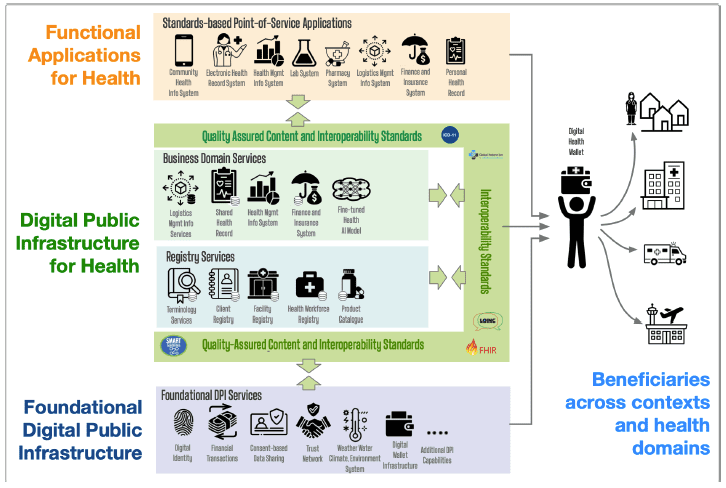
Call for Submissions: Technical Experts for WHO-ITU Technical Working Group on Reference Architecture for Digital Public Infrastructure for Health
The World Health Organization (WHO) and the International Telecommunication Union (ITU) are jointly launching a call for submissions from technical experts in the field of digital health. We are inviting contributions from professionals with experience in the development, implementation, and evaluation of Digital Public Infrastructure (DPI) for health goals, as well those involved with formulation of technical and implementation guidance and specifications. Your insights and expertise will contribute to the formation of a Technical Working Group, as part of the Global Initiative on Digital Health (GIDH), focused on advancing the use of DPI to achieve broader national health objectives.
Submission Categories:
- Country Examples: Detailed case studies showcasing successful implementation of DPI in the health sector. We are particularly interested in examples that demonstrate the integration of cross-sectoral foundational DPI with health-specific DPI components.
- Technical Guidance Documents: Normative guidance or standards-based documents that outline best practices for designing and implementing DPI for health goals. This includes interoperability standards, modular system designs, and frameworks for data governance and security.
- Implementation Experience: Practical insights and lessons learned from implementing DPI in various health contexts, including challenges faced and strategies used to overcome them.
- Technical Specifications: Detailed specifications of cross-sectoral and health-specific DPI building blocks, particularly those tailored for health applications, that are rooted in open standards and designed for scalability and interoperability.
Importance of DPI and quality-assured content for health goals
A robust DPI for Health catalyzes and enables locally owned innovation in integrated and interoperable digital health solutions. This facilitates the health sector to achieve its goals in a more efficient and cost-effective manner while minimizing risks. The benefits extend across multiple dimensions:1
- Continuity of Care: Enhancing overall continuity of care by facilitating seamless information exchange across health care providers.
- Quality of care: Promoting adherence to evidence-based clinical guidelines and best practices through standardized protocols to ensure quality of care.
- Reducing burden on health workers: Reduce inefficiencies in administrative processes health workers are responsible for, to optimize health workers’ skills and time when there is a global health workforce shortage. Efficiency and Affordability: Optimizing the efficiency and affordability of services by reducing duplication of effort and ensuring effective resource utilization.
- Health Financing: Influencing health-financing models and processes through enhanced data availability and standardization.
- Regulation and Oversight: Strengthening regulation, oversight, and patient safety by leveraging performance data and reducing errors.
- Data-driven Policy-Making and Resource Allocation: Informing health policy-making and resource allocation through improved data quality and insights.
Purpose of Technical Working Group:
The contributions will form a critical foundation for developing a comprehensive DPI Reference Architecture Toolkit for National Digital Health Transformation. This toolkit will be instrumental in guiding countries to leverage DPI effectively in achieving health goals such as enhancing quality and continuity of care, optimizing supply chain management, and improving health system resilience.
Working Group Responsibilities:
Selected experts will be invited to join Technical Working Groups, focused on one or more illustrative areas:
- Use Case Development: Focus on identifying and refining use cases where cross-sectoral and health-specific DPI have been used successfully to advance specific health sector goals and outcomes.
- DPI Resources and Standards: Concentrate on developing reference architecture guidance and technical specifications for health-specific DPI components aligned with interoperability standards.
How to Submit:
Deadline: All submissions must be received by September 5, 2024.
Format: Submissions should be through this linked form, and include a brief overview of your BIO, your work in health and digital transformation and its relevance to the use of DPI for health, and the impact it has had or is expected to have, and any relevant case-studies, guidance or technical specifications you have developed or used.
Submission Portal: Please submit your documents via the online submission form.
Benefits of Participation:
Global Impact: Contribute to shaping a global framework and accompanying guidance that will influence digital health transformation efforts worldwide.
Collaboration: Work alongside international experts and organizations to develop relevant implementation and technical guidance that will contribute to capacity building, implementation and investments on digital in the health sector.
Recognition: Be acknowledged as a contributor.
Please note that the working language for the technical working group will be English. For further information or inquiries, please contact Dr Garrett Mehl (WHO) or Hani Eskandar (ITU).
We look forward to your valuable contributions to this critical initiative that aims to accelerate the global digital transformation of health systems through the effective use of Digital Public Infrastructure.
This call for submissions builds on the momentum of the WHO and ITU’s joint efforts to promote inclusive and scalable digital ecosystems, as highlighted during the recent GIDH Multi-stakeholder Dialogue and aligns with the broader goals of the Global Strategy on Digital Health 2020-2025.
1 Digital Health Platform Handbook

Download a PDF copy of this information at the link below.
